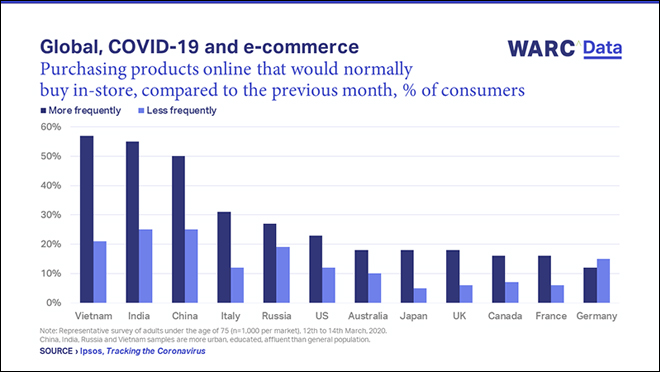
E-commerce had been steadily gaining momentum — the world over and also in India much before COVID19 happened. By and large the onset of the pandemic and the ensuing lockdown has thrown the progression of online purchasing off balance because of restrictions on eligible items to essentials and due to the limitations placed on physical movement directly impacting deliveries. Nevertheless, experiences of life during the lockdown may result in nudging attitudes towards opting for e-commerce once things are back to normal.
Prior to the pandemic, attitudes towards shopping online had broadly clear distinctions between those for whom it was a matter of convenience whether it be groceries and staples or recreational items; and those for whom it was imperative to shop from physical markets and brick and mortar stores because they are a more active process. The pandemic has created a shift in the way consumers behave and carry out their activities, directly affecting the e-commerce industry. The situation that only essentials and especially medical supplies are being made available and also people are not inclined to spend money beyond their necessities, offers both challenges as well as opportunities.
Based on a market research before the Covid outbreak, it was predicted that the growth in the e-commerce market in India would reach 200 billion US dollars by the year 2026. Post the outbreak, recent trends suggest that the goal of 200 Billion U.S. Dollars may be reached a lot sooner than originally predicted spurred by a jump in consumers opting for online deliveries amid fears of possible infection if they step out of their homes. The e-commerce sector is being impacted on the supply as well as the demand side and while some companies are able to adapt and respond to the changes, others are not able to because of the nature of limitations that have been imposed.
 Source: https://www.warc.com/content/paywall/article/WARC-DATAPOINTS/Ecommerce_shopping_more_frequent_because_of_COVID19/132077
Source: https://www.warc.com/content/paywall/article/WARC-DATAPOINTS/Ecommerce_shopping_more_frequent_because_of_COVID19/132077
On the one hand there has been a decline in sales of fast-moving consumer goods since the lockdown and a survey conducted by Digital Commerce in March 2020 found that from among 304 e-commerce retailers about 36% strongly felt that their businesses will face a significant downfall while 42% of them felt that there will be shift in consumer confidence. Another major problem is the shortage of staff which makes it difficult for companies to attend to orders. Online supermarkets like Grofers and BigBasket report that they only have access to 60% and 50% of the total staff respectively, due to the pandemic and hence can only meet order deliveries at a reduced frequency which has put pressure on the availability of slots for consumers. Similarly, Amazon has suspended deliveries of certain goods and only restricted deliveries to essentials in light of the staff and logistical crisis ensuing as a result of the lockdown.
On the other hand, there are many B2B services that have been launching new platforms in the area of healthcare, delivering goods ranging from essential medical care supplies to even ventilators. Many retailers dealing specifically with essential goods have witnessed a boom in business. Companies engaging with healthcare facilities believe that people are indulging in regularly monitoring the health and fitness of their families, leading to these businesses having a higher engagement with customers. E-commerce businesses are also improvising amid the lockdown to stay afloat. Online food ordering and delivery platforms like Swiggy and Zomato have introduced contactless deliveries to allay heightened apprehensions related to hygiene that exists right now. Besides these new platforms, gaming and Over the Top (OTT) media are booming as screen times of people have risen exponentially. Online streaming service, Netflix, has reportedly added a whopping 15.8 million paid subscribers in the first three months of 2020 which coincides with the initiation of lockdown and social distancing in various parts of the world.
The instance of kirana shops also requires mention in this respect. Even prior to the pandemic there have been concerns regarding the future of kirana shops which are the lifeblood of local communities from cities to villages and which faced stiff competition from digital commerce platforms. Nevertheless, it was also understood that culturally, these shops have a very important role to play as hubs for gathering socially while being the preferred destination for daily items like bread and milk. It was in the acknowledging of this aspect that Reliance had announced plans of connecting kirana stores with consumers digitally. Amid the pandemic, this development is taking place sooner than expected with the government tapping logistics firms to link these shops with consumers and simultaneously relaxing the required approvals for opening such stores. While debates may continue regarding the future of kirana shops, it is far more likely that they will adapt and stay the course for the long run.
In the short term there will likely be a boost to some sectors of e-commerce as people would continue to be apprehensive of stepping out frequently even after the lockdown ends. But again, in the short term, scaling up of the supply chain in keeping with requisite safety measures will be a challenge. While it is safe to say that the entire e-commerce industry will not be seeing a positive net change, the fact that it shall surely thrive more than brick and mortar stores can be relatively safe assumption. In the long term, however, the growth of e-commerce would depend on how efficiently they provide and adapt their services in accordance with general consumer psyche. Probably, companies which are able to respond better during this period will be able to better tap into the potential shifts in attitudes towards online purchasing. At the same time however, hyper-local shops like kirana stores are not likely to be endangered but rather transform their services with the help of digital logistics platforms.
While many of the trends being mapped at the moment may be temporary, they will nonetheless have an impact on the attitudes of people towards online shopping with the possibility that a greater percentage of people (than what was prevalent before the pandemic but less than the percentage during the same period) opting for the convenience offered by online platforms.
The co-author is a Research Intern at ORF Kolkata.
The views expressed above belong to the author(s). ORF research and analyses now available on Telegram! Click here to access our curated content — blogs, longforms and interviews.




 Source: https://www.warc.com/content/paywall/article/WARC-DATAPOINTS/Ecommerce_shopping_more_frequent_because_of_COVID19/132077
Source: https://www.warc.com/content/paywall/article/WARC-DATAPOINTS/Ecommerce_shopping_more_frequent_because_of_COVID19/132077 PREV
PREV


